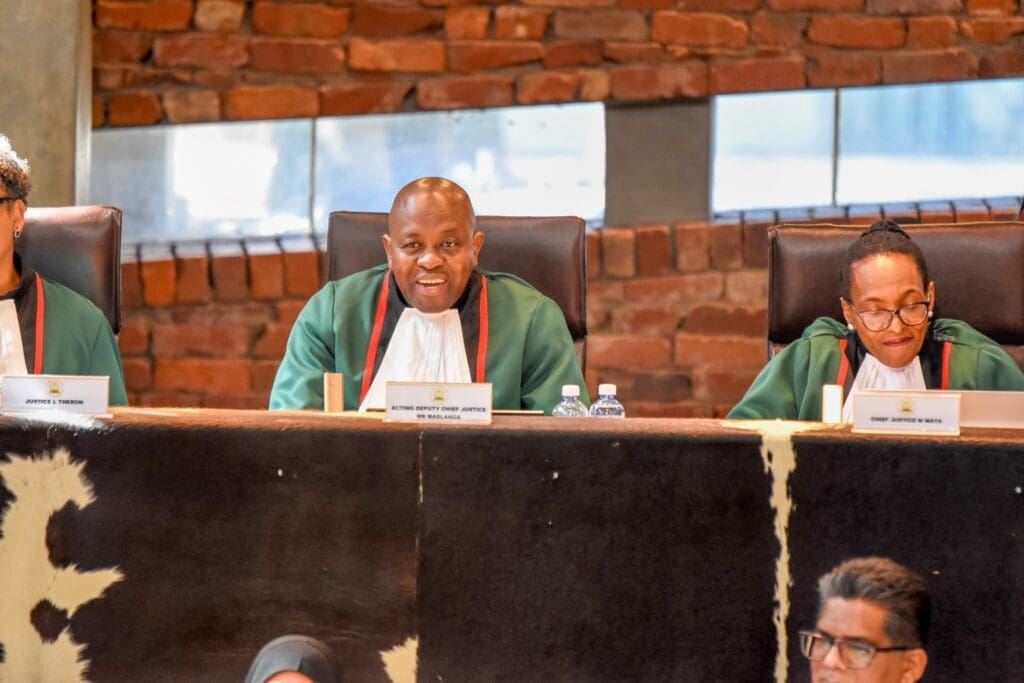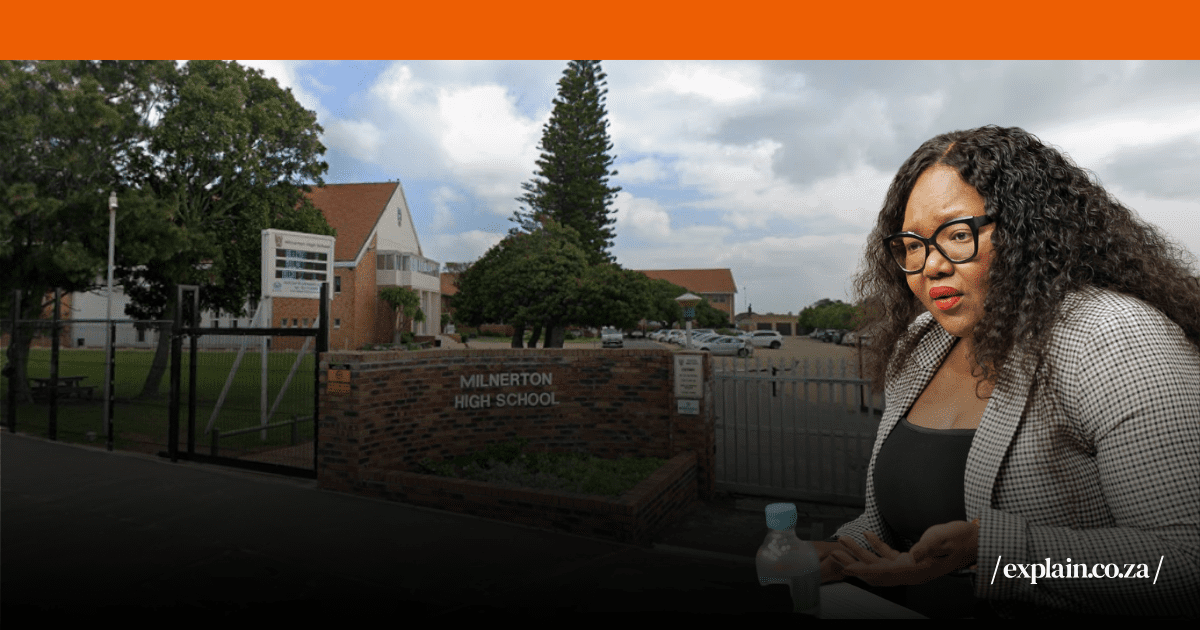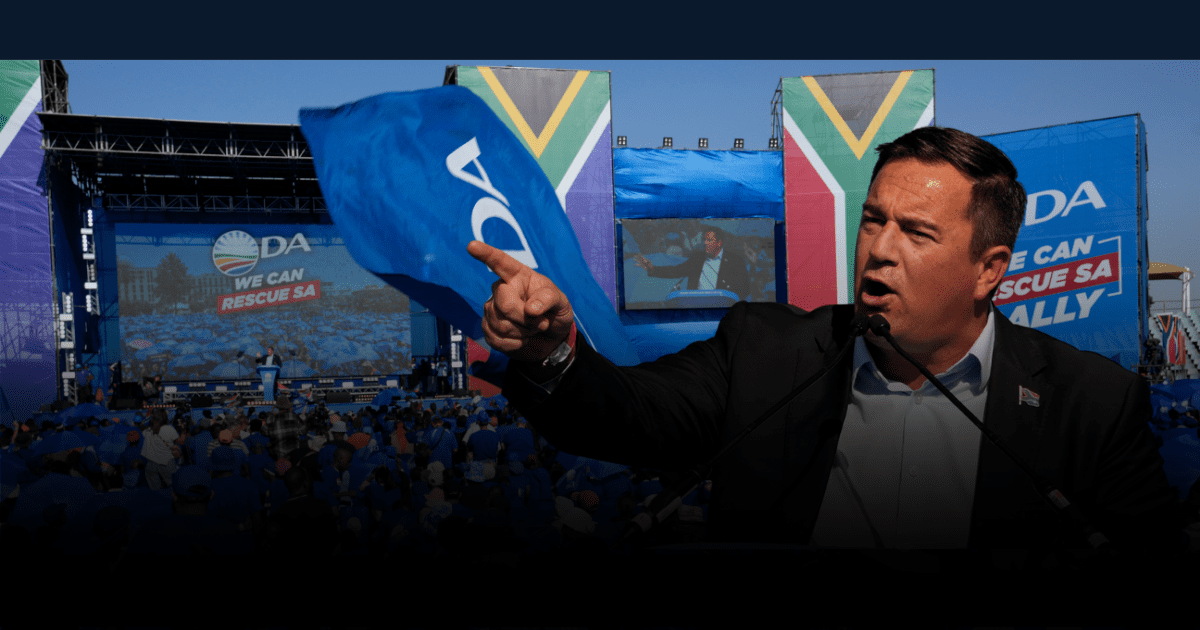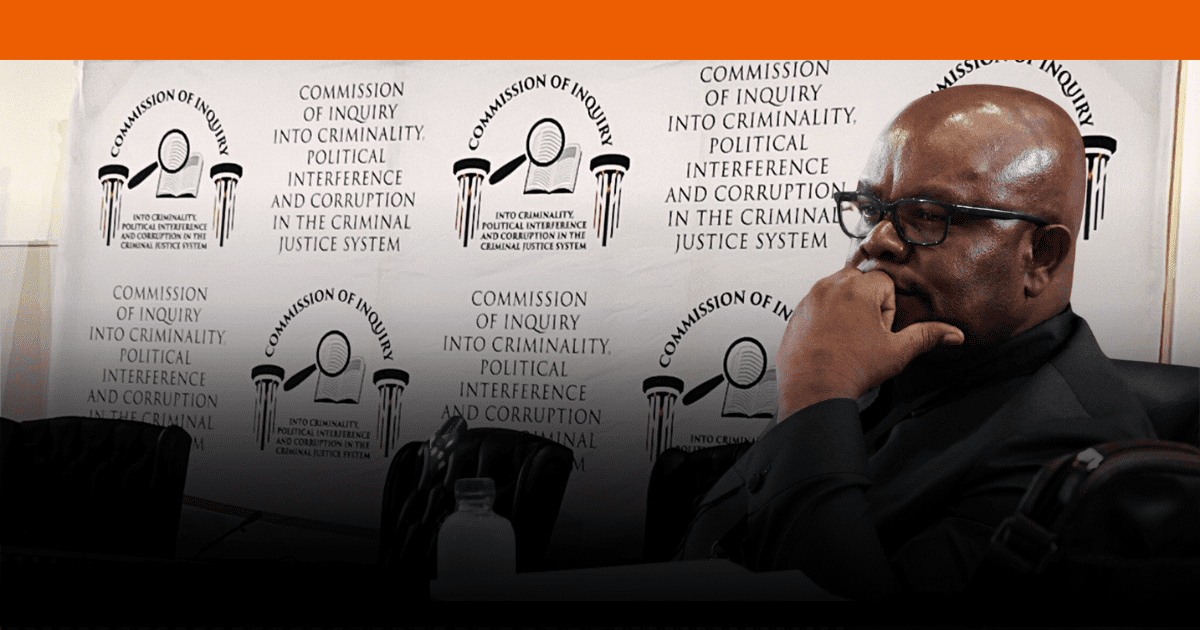Hi there 🙋🏾♀️
This week, a shocking bullying incident at a Cape Town high school has the whole of Mzansi riled up. We break it down for you. And if your parents haven’t told you, bullying is wrong.
Meanwhile, embattled police minister Senzo Mchunu faced Parliament’s ad-hoc committee this week, and it’s been… interesting. Jacob Zuma is back in the headlines, and he has a big bill to pay. But your bills might be coming down with food prices easing. We also tell you about the cinema-style heist of the Louvre in Paris, how a member of the royal family is losing everything and how ChatGPT is getting spicy. In our long briefs, we break down the big bads mentioned at the Madlanga Commission and explain why and how the DA wants to replace BEE.
So, let’s dive into these stories and more in this week’s wrap, brought to you by Verashni Pillay and the explain.co.za team. 😄
Format:
▁ ▂ ▄ ▅ ▆ ▇ █ BRIEFS

NATIONAL
- Suspended police minister Senzo Mchunu tried to distance himself from the thugs behind the police crisis. He took the hot seat at parly’s ad hoc committee this week, using an affidavit from alleged underworld figure Vusimuzi “Cat” Matlala to make the point that the two had never met. Mchunu and his home province of KZN are important to the ANC. It’s the party’s biggest single voting bloc, The South African Brief reported, but noted “Mchunu now appears more of a liability than asset to the president”.
- The law is catching up with Msholozi’s legal tabs. 💸 The Gauteng High Court yesterday ordered Jacob Zuma to repay R28.9 million in taxpayer-funded legal fees from his corruption saga — plus interest. If he doesn’t within 60 days, the state can seize his assets, pension and all. The ruling ends years of back-and-forth over who foots Zuma’s bills — overturning an Mbeki-era deal saying government would. Zuma hasn’t responded, but the man who made “Stalingrad strategy” a national sport may appeal.
- Some good news for your wallet — food prices are finally easing. Stats SA said yesterday that inflation crept up slightly to 3.4% in September, but the cost of essentials like milk, eggs and veggies actually fell. 🍳 Agricultural economist Wandile Sihlobo credits bumper harvests and cheaper global grain with food inflation down to 4.4%, the lowest in nearly two years. It’s a small win for stretched households — and a sign the Reserve Bank might keep interest rates steady.
- South Africa rules African hockey — again 🏑🇿🇦 Earlier this week, our men’s and women’s hockey teams just pulled off a golden double at the Africa Hockey Cup of Nations in Egypt, crushing the competition to book their spots at the 2026 FIH Hockey World Cup. The men’s side thrashed Egypt 5–1 in the final — their biggest win margin ever — while the women swept past Ghana, 4–0. It’s SA’s eighth continental crown that cements our hockey dominance. Next stop: Belgium and the Netherlands.
- From Chatsworth to Lenasia, Mzansi lit up for Diwali on Monday. The Festival of Lights marks good’s triumph over evil. 🪔 Homes sparkled, fireworks popped, and families feasted. 🎆 President Cyril Ramaphosa praised the Hindu community for promoting “unity and inclusion.” SA’s 1.6 million Indian-origin citizens — nearly two-thirds Hindu — trace their roots back 165 years to the first indentured workers who arrived in 1860. This week, they reminded us that light, hope, and resilience still burn bright.
INTERNATIONAL
- In true Netflix fashion, thieves pulled off a $102 million heist at Paris’s Louvre on Sunday. Using a truck with a lift and a disc cutter, they broke into the Apollo Gallery, threatened guards, and vanished on scooters with France’s crown jewels in just eight minutes. 😲 This follows a spate of theft at other French museums, exposing serious security flaws. The search for suspects is still underway, and the internet’s already calling it the crime of the century.
- The UK’s Prince Andrew volunteered last Friday to give up his Duke of York title and royal honours, following pressure from big brother, King Charles. But MPs went a step further — lodging a rare motion to strip him of his dukedom formally. It follows outrage over revelations that he’s lived rent-free for two decades at Windsor’s Royal Lodge and new claims in Virginia Giuffre’s posthumous memoir that she was assaulted by him three times after being trafficked by Jeffrey Epstein.
- The US-brokered Gaza ceasefire, announced earlier this month, is under strain. By Monday, Israel had killed nearly 100 Palestinians in Gaza and wounded 230 since the ceasefire, claiming Hamas fighters had attacked its soldiers. Yesterday, the International Court of Justice ruled Israel must allow aid into Gaza and stop using starvation as a weapon of war. US Vice President JD Vance insisted the US wasn’t in Israel to “babysit” the truce, but violence and aid blockages tell a different story.
- A single glitch at Amazon Web Services on Monday knocked out banks, airlines, and even Alexa herself. A botched update at a Virginia data centre froze 113 AWS services and sent apps like Snapchat, Slack, and Zoom offline for hours. Amazon apologised, and services were restored by Monday afternoon. But experts warn it shows just how fragile the web’s backbone really is. When one company runs a third of the internet, we’re all one typo away from chaos. 🫣
- ChatGPT’s next update? NSFW mode. 😳 Last week, OpenAI CEO Sam Altman announced that ChatGPT will soon allow erotica for verified adults. The update drops in December as part of OpenAI’s new “treat adults like adults” policy, though it remains unclear what material will qualify as permitted erotica. Altman says the move comes after tackling mental-health concerns and over-restrictive filters. Critics, though, worry it’s a slippery slope between innovation and obsession. Either way, the internet is blushing.
▁ ▂ ▄ ▅ ▆ ▇ █ BIG STORIES

1️⃣Outrage at Milnerton High over viral assault video
The big story this week took place at Milnerton High School in Cape Town. A shocking video showing a 16‑year‑old Grade 10 learner being assaulted by his classmates went viral, triggered national outrage, protests and yes, even police stun grenades.
The two‑minute clip shows the boy being beaten with a belt, stick and hose‑pipe while others record and laugh. The victim can be heard begging for the attack to stop. The footage sparked widespread horror among parents, activists and the public.
According to reports, he was one of several pupils allegedly targeted in what some are calling a violent initiation ritual. Some of the attackers are said to be part of the school’s First Team Rugby squad.
The Western Cape Education Department (WCED), which has oversight of the public school, responded by suspending eight Grade 11 learners pending disciplinary hearings. WCED spokesperson Bronagh Hammond said counselling was being offered and urged the public not to share the video, warning that it violates the victim’s rights and worsens the trauma.
Things escalated on Wednesday when angry parents and community members gathered outside the school demanding accountability. Tensions quickly rose when police used stun grenades and shields to disperse the crowd. Protesters accused the school of ignoring years of complaints about bullying and favouritism, particularly referring to the Rugby squad, and general reluctance from the school to punish athletes.
Police have opened a case of assault with intent to cause grievous bodily harm against the eight pupils. The 17 and 18-year-olds are expected to appear in Cape Town Magistrate’s Court today, after handing themselves over to the police this morning.
The incident has reignited long‐standing concerns about school safety and the prevalence of hazing or bullying, especially in environments where sport culture is intense and oversight is weak. Parliament’s education committee chair, Joy Maimela, said the incident was not just bullying but assault and a criminal offence.Now, Milnerton High’s leadership faces a reckoning. Parents want transparency. Learners want safety. And the country wants proof that accountability will not fade once the outrage does.

2️⃣The Madlanga Commission’s ‘Big Five’ explained
Struggling to keep up with the barrage of allegations coming out of the Madlanga Commission? That’s why we’re doing a series of explainers on the police crisis under the spotlight in our country. In the first of these, we tackle the so-called “Big Five”.
🔹When did we first hear about them?
The idea of a criminal cartel infiltrating the police was first raised in July during KwaZulu-Natal Police Commissioner Lt-Gen Nhlanhla Mkhwanazi’s bombshell press briefing. Mkhwanazi, who has since become something of a celebrity, noted WhatsApp messages and financial records that exposed high-level corruption.
Since then, the cartel has popped up in testimony before the Madlanga Commission and the Parliament’s Ad Hoc Committee on SAPS, which is running in parallel, albeit with a narrower scope. Both were set up in response to Mkhwanazi’s allegations.
🔹Who are the Big Five?
Based in Gauteng, much of the cartel’s leadership remains under wraps. Authorities are keeping names secret to avoid tipping off suspects and to protect ongoing investigations. Only two have been publicly named.
- Vusimuzi “Cat” Matlala: A Gauteng businessman, he is accused of using his company to secure lucrative state tenders while allegedly manipulating political connections and law enforcement for personal gain. Matlala’s criminal empire has been scrutinised for numerous infractions. His company, Medicare 24 Tshwane District, secured a R360 million deal with the SAPS for health services despite being embroiled in the Tembisa hospital fraud scandal.
- Katiso “KT” Molefe: Once a National Lotteries Board manager, Molefe is linked to drug trafficking, murder, and political manipulation. His transition from public service to criminal mastermind has seen him linked to murders, extortion, and the violent enforcement of his syndicate’s interests.
🔹How do they operate?
According to Lt-Gen Dumisani Khumalo’s testimony, which first used the phrase ‘Big Five’, the cartel runs multiple smaller syndicates, each specialising in different illegal activities such as drugs, extortion, and hijackings. They strategically infiltrate key industries and government sectors, using insider knowledge and political donations to protect their operations. Investigators have presented chilling evidence, including WhatsApp chats that show Matlala bribing officials to block investigations.
🔹What happens next?
As the two inquiries progress, their findings are likely to converge. The Madlanga Commission will make recommendations directly to the President, while Parliament’s Ad Hoc Committee could trigger disciplinary or criminal proceedings.
Still, converting testimony into convictions will take time. Some of the accused are powerful, well-connected figures who have already survived previous probes. Whether this time will be different depends largely on whether the National Prosecuting Authority and SAPS can withstand political pressure and act on the evidence.
Check out the full explainer package on the ‘Big Five’ on explain.co.za.

3️⃣DA’s new bill aims to replace BEE
SA’s black economic empowerment policies have long been under fire. (Thanks, Elon Musk). The argument goes that it’s benefited a few privileged insiders while the majority of black South Africans are still impoverished.
On Tuesday, DA gazetted their “Economic Inclusion for All Bill”: their pitch to replace Broad-Based Black Economic Empowerment in favour of something they say is fairer and more effective.
Explainer: When a bill is gazetted, it means it’s been formally published in government’s official records as a first step before becoming law. This makes it public and invites comments before heading to Parliament. From there, it needs to go through several rounds: committee discussions, National Assembly debates, votes, and then, if it survives, the National Council of Provinces before the President signs it into law. Given the DA’s numbers (fewer than a quarter of the seats in Parliament), it’ll need major backing from other parties if it’s to succeed in amending the Public Procurement Amendment Act of 2024.
So, what’s the issue? Introduced back in 2003 under the ANC, BEE was meant to right the wrongs of apartheid by giving black South Africans a bigger slice of the economic pie through things like ownership deals, skills training, and preferential procurement. But the DA says BEE has fuelled corruption and encouraged “fronting” where companies fake compliance, and has largely failed. They’re not wrong: 44 million South Africans live in poverty, and 12 million are unemployed. Unemployment among black South Africans hit 36% in the last quarter of 2024, compared with 7% among white South Africans.
Instead of race as the main criterion, the DA’s proposed bill shifts to poverty and disadvantage as the key indicators. Government tenders would reward companies for real impacts: job creation, skills development, poverty reduction, and even green initiatives like renewable energy.
Critics like the ANC and the Black Business Council have hit back, while President Cyril Ramaphosa, when asked, said he hadn’t seen the bill yet but urged the DA to take it through Parliament.
Our opinion? The DA is hardly known for its pro-affirmative policies at the best of times, an issue that saw Lindiwe Mazibuko ousted back in 2013. The party haemorrhaged more black leaders over time. As the party swings more white and right, the risk is that the bill is less about empowering the black majority and more about allowing white-owned companies resistant to transformation to continue benefiting people who remind the white executives at the top of themselves, which is how affinity bias works.
Is SA ready to ditch a race-based system when white people occupied 65.9% of top management level posts in 2022, while making up just 8% of the population? That’s according to South Africa’s Commission for Employment Equity data. A revised BEE is needed, but one that still holds private companies accountable when it comes to race.
What do you think: time to drop race completely, or is BEE worth fixing?
That’s it from us at The Wrap, an award-winning product of explain.co.za – simple news summaries for busy people. 💁🏾♀
The Wrap is sponsored by explain’s agency division. We specialise in content marketing for purpose-driven organisations, often with a pan-African reach. Mail info@explain.co.za for a quote.
🇸🇺🇧🇸🇨🇷🇮🇧🇪
Remember to share the love. 💫
Tell your friends to sign up:
📩 Email: http://explain.co.za/subscribe
📲 Our new WhatsApp channel: https:




